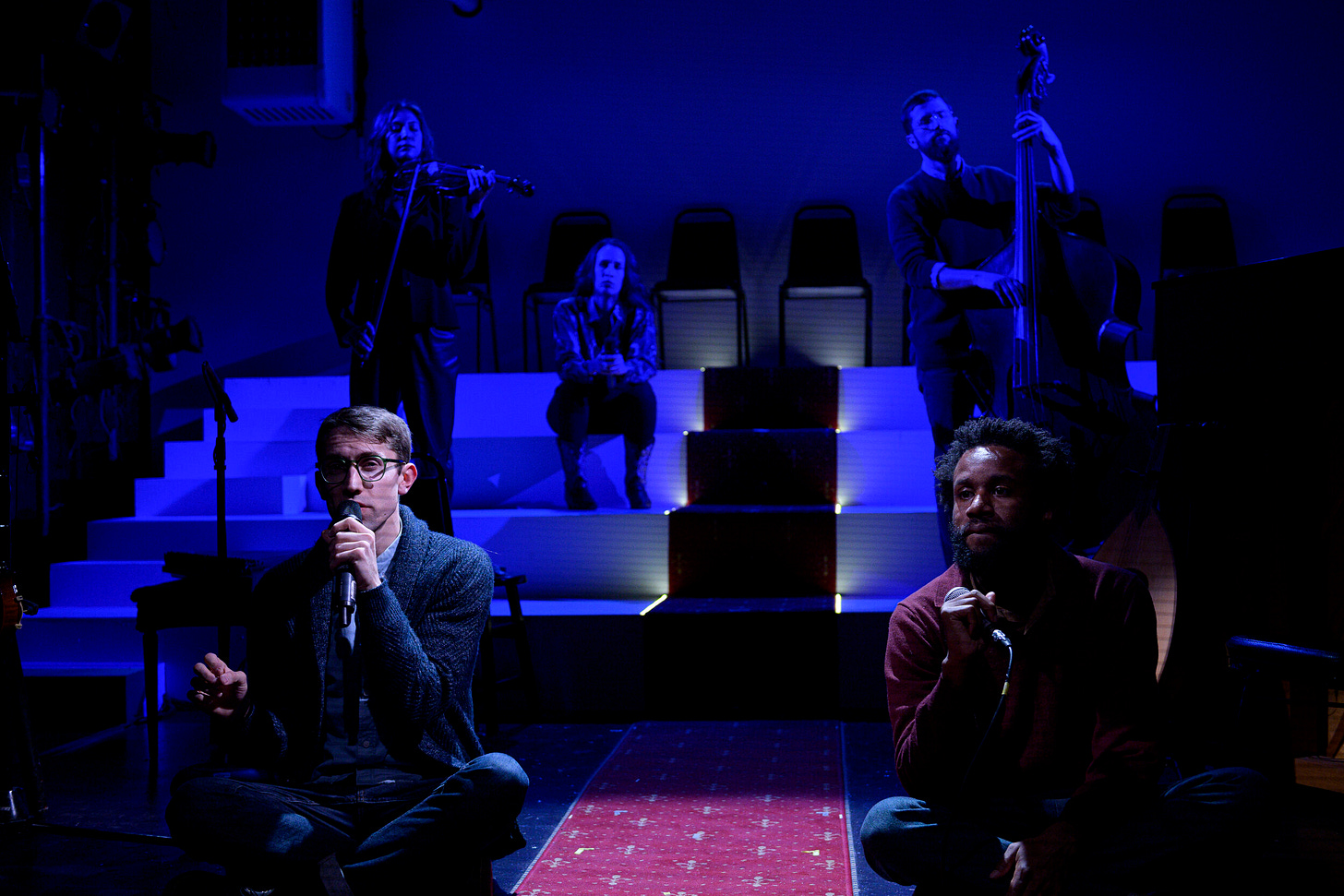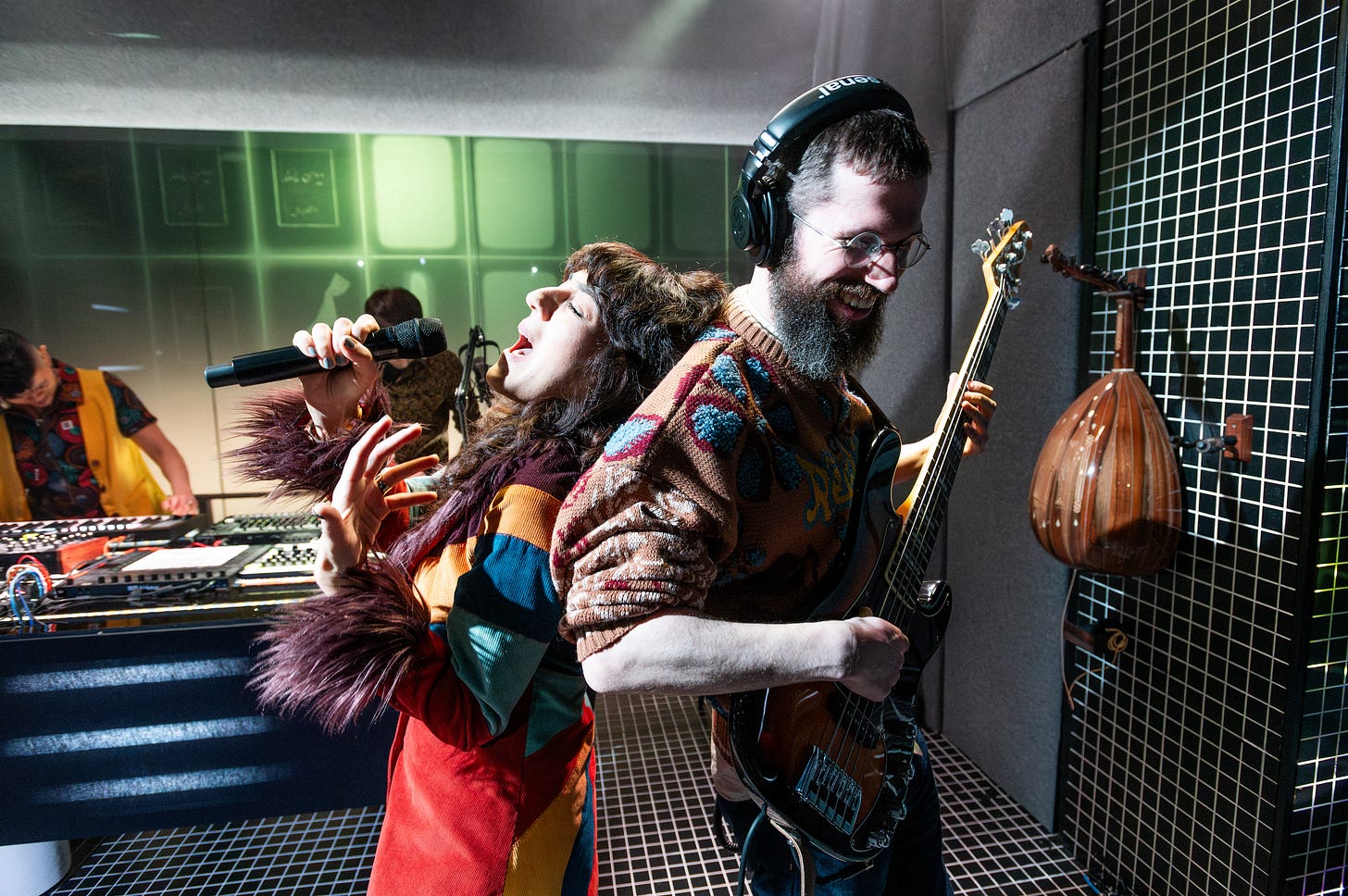In ‘Travels,’ Ars Nova Becomes a Listening Bar for a Sonic Odyssey
Storyteller James Harrison Monaco and friends craft an epic travelogue set to music

In just the last few years, a slew of “listening bars” have opened across New York City. A growing trend that finds its historic roots in the jazz kissa — Japanese cafes designed for close listening to jazz music — these bars are sophisticated, often chic spaces designed for soft-toned speaking and careful attention to music. Most have drinks, and many offer food. But the focus, above all else, is total immersion in the journey of the sounds.
When they began design work on James Harrison Monaco’s Travels, a kaleidoscopic travelogue set to music, director Andrew Scoville and scenic designer Diggle looked to listening bars for inspiration – specifically Doka, an intimate sound bar in Amsterdam.
“We want it to feel like a space where the primary purpose is to listen,” said Scoville.
Entering Ars Nova’s narrow and intimate West 54th Street theater, where Travels runs through April 20th, one finds the space transformed. Tube lights extend out from the stage and along the walls, shooting flashes of green, blue and red into the audience. A glowing, almost futuristic DJ console sits center-stage. Scattered around it is a homelier clutter — dim lamps, stacks of vinyls, scattered books. Long couches now make up the first two rows of seating, with padded lab stools behind them.
The fast-talking Monaco steps out and tells the first story solo. He barrels frenetically from one detail to the next, gesticulating wildly, excited to share his each and every discovery — the thrilling style Monaco has perfected over years of performance work.
Then, when the story is done, he turns to “Storyteller #2,” singer/songwriter Ashley De La Rosa (pray).
“Hey Ashley,” says Monaco. “Could you come help me out with this one?”
Monaco and company will tell eight stories over the following 90 minutes — tales of refugees, immigration, assimilation and cross-cultural connection, all shaped around global movement. Some are spoken, others sung; most are a bit of both. The singing is backed by live beats, synthesizers and instrumentation. The tales traverse Switzerland, Turkey, Iran, Mexico, and Newport Beach, California. All are drawn from Monaco’s own experiences, though most have been heavily fictionalized.
Key to each story is not only the tale itself, but how and from whom Monaco received it.
“All of the stories are themselves about what happens when a story is passed from one person to another,” said Monaco.
Monaco gathered the stories by listening closely — eagerly taking in every detail of the rich, complex individuals he came across in his travels. In Travels, he has invited along four artists to bring a range of musical qualities to each tale, from contemporary club beats to traditional Middle Eastern strings.
“I love all of these different rhythms possible for telling a story,” said Monaco. “Varying them felt both faithful to the tradition of the DJ set, and also helpful in keeping our ears open, in different ways, for each story.”
Monaco picked up the second tale, which De La Rosa performs, while lounging on the balcony of his Airbnb in Rio de Janeiro. He asked the man next to him, a middle-aged, “tender-hearted” Swiss-German man named Thomas, what had brought him to Rio.
Leaning in, Thomas demanded: “Do you really wanna know?”
Monaco first performed Thomas’ epic tale, a love story spanning multiple decades and continents, at a works-in-progress event hosted by Fresh Ground Pepper in 2019. Shortly afterwards, Ars Nova commissioned Monaco and his then-creative partner JJJJJerome Ellis to write a full-length piece built around travel stories.
Around the same time, “James & Jerome” presented The Conversationalists at The Bushwick Starr. Built as a theatricalized reading of an unproduced film script, the show — like Travels — moved fluidly between narration and music. Monaco described every direction and camera angle; Ellis handled the music, an eclectic mix of pop, Latin and Arabic styles.
“The music and the words are the titular conversation,” wrote Helen Shaw in Vulture, reviewing Conversationalists in January 2020. “Ellis’s looping improvisational jazz talks to Monaco, and Monaco talks back.”
On Travels, Monaco ultimately took the lead after Ellis stepped away from theater work in 2020. (Ellis has since moved to Virginia, and shifted focus to poetry and music composition.) But it was quickly clear that Monaco wouldn’t be able to tell these stories alone.
“A couple of the stories wanted someone who could be a real powerhouse vocally, or lead a big ballad,” said Monaco. “And while I enjoy singing, I wouldn’t say those are my strong suits.”
So Thomas’ love story is performed by De La Rosa, a powerhouse voice, who explains as she takes over the mic: “I’m still telling the story kind of as James, but also kind of as me ... Just vibe with it.” From here, the stories are shared.
The show finds its throughline in “R,” an Iranian journalist and former political prisoner who Monaco first meets at a party in New York. His journey is relayed at different points by a pleasingly dry El Beh, a Chinese-American genderqueer writer/performer; the charming and beguiling Mehry Eslaminia, an El Salvadorian-Iranian-American singer/songwriter; and instrumentalist John Murchison, who moves between the electric bass guitar, qanun, oud, monosynth, polysynth, and TR8S drum machine.
This approach opened up exciting musical possibilities — but also introduced tricky questions around who these stories belonged to, who was best suited to delivering them, and how much the performers would make each story their own. These are questions that, Monaco admitted, the team is still working through.
“My work is often about people from different cultures interacting with each other, finding things in common, recognizing difference,” said Monaco. While recognizing the danger of ignorance (or even violence) in telling stories drawn from cultures not his own, Monaco seeks to draw connections which push past fictitious borders designed to divide.
“Whether or not an upper-middle-class white person in the USA wants to recognize it, their life is intimately bound up with the lives of people from very different backgrounds than them,” he went on. “Who do they converse with, even if just in passing? Whose lives are affected by our legislation, and vice versa? How is sexual longing and fantasy tied up in all this? And what happens to you when someone else tells you their story?
“Turning away from that stuff feels very bad, and boring — even if turning toward it requires enormous care and accountability.”
So by the time Eslaminia delivers the show’s sixth story, “R’s Librarian,” there is an almost dizzying degree of layering to the form of Travels: we are hearing R’s story, as it was told to Monaco, but now delivered by Eslaminia, who is bringing some mix of Monaco’s own enthusiasm but also her individual passion to this tale. Cultures layered upon cultures, all of them present on stage in a single body.
Ultimately, Monaco strongly responded to all these stories — and he hopes to pass that feeling onto us.
We only need to listen carefully.






